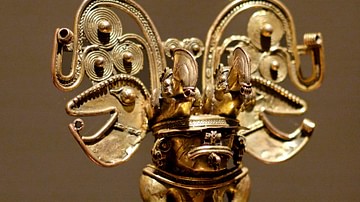Search Definitions
Browse Content (p. 215)

Definition
Tribune
Tribune was a title of various offices in ancient Rome, the two most important of which were the tribuni plebis and tribuni militum. The military tribunes were responsible for many administrative and logistics duties, and could lead a section...

Definition
Vigiles - Ancient Rome's Fire Service
The vigiles (or cohortes vigilum) were formed during the reign of Augustus to act as ancient Rome's permanent firefighting service. Evolving from earlier slave teams, the vigiles were organised as an urban military unit and eventually recruits...

Definition
Tairona Civilization
The Tairona civilization - one of the Chibcha family tribes - flourished in northern Colombia between 200 CE and 1600 CE. Like the Muisca of Cundinamarca, the Tairona were known for their expertise in crafting and metallurgy, especially goldsmithing...

Definition
Praetorian Guard
The Praetorian Guard (cohortes praetoriae) was, in the Roman Republic, a commander's personal bodyguard and then, in the imperial period, an elite force assigned to protect the emperor and Rome. Over the years, the guard would become a dangerous...

Definition
Later Three Kingdoms Period
The Later Three Kingdoms period (889-935 CE) of ancient Korea saw a partial revival of the old three kingdoms which had dominated the peninsula from the 1st century BCE to the 7th century CE. After the Unified Silla kingdom had ruled Korea...

Definition
Lucius Verus
Lucius Verus was Roman emperor from 161 to 169 CE. Lucius Verus was Marcus Aurelius' adopted brother and co-emperor, a man whose time on the throne is overshadowed by the reign of the last of the Five Good Emperors. In the final years of...

Definition
Jang Bogo - Korea's King of the Yellow Sea
Jang Bogo (aka Chang Pogo or Gungbok) was a powerful Korean warlord, naval commander, and merchant who came to monopolise maritime trade in northeast Asia to such a degree that he was known as the 'King of the Yellow Sea' during the first...

Definition
Ancient Pyongyang
Pyongyang (aka Pyeongyang) was the capital of several successive ancient Korean kingdoms. Located on the Daedong River in the north of the peninsula, the site was chosen by the legendary Dangun (Tangun), founder of the first Korean state...

Definition
Gyeongju
Gyeongju (Kyongju), formerly known as Seorabeol or Saro, was the capital of the Silla kingdom of ancient Korea from the 1st century BCE to the 10th century CE. Located in the south-east of the Korean peninsula, at its peak in the 9th century...

Definition
Hwarang
The hwarang was a state-sponsored organisation for the education of elite young males in the ancient kingdom of Silla, Korea. Variously translated as the 'Flower Boys,' 'Flowering Youth,' or 'Elite Youth' (and sometimes, too, the rather misleading...